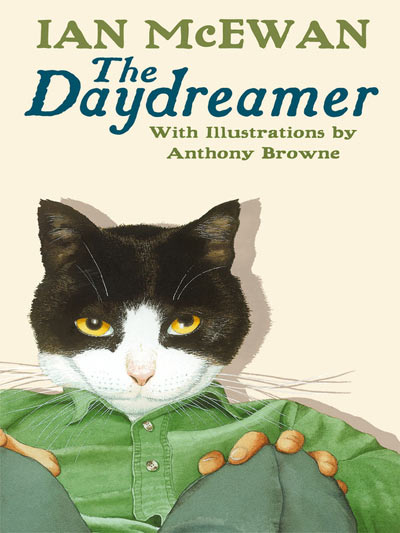當(dāng)前位置: Language Tips> 英語學(xué)習(xí)專欄
分享到
很難想象以陰郁和壓抑的敘事風(fēng)格而為人所知的英國(guó)當(dāng)代著名作家伊恩?麥克尤恩會(huì)寫一本睡前故事書。在《夢(mèng)想家彼得》中,那種若無其事的敘事口吻、緩慢漸進(jìn)的敘事節(jié)奏,以及返璞歸真的想象力,都證明了麥克尤恩是一位收放自如的成熟作家。書中借彼得的視角探討了愛、死、痛、理解、靈魂等深層次的主題,但本期選段首先帶我們走進(jìn)這位十歲兒童的奇異世界,探究在他寡言少語的外表下究竟隱藏著怎樣一顆童真的心。

By Ian McEwan
安妮 選 言佳 譯
|
When Peter Fortune was ten years old grown-up people sometimes used to tell him he was a “difficult” child. He never understood what they meant. He didn’t feel difficult at all. He didn’t throw milk bottles at the garden wall, or tip tomato ketchup over his head and pretend it was blood, or slash at his granny’s ankle with his sword, though he occasionally thought of these things. Apart from all vegetables except potatoes, and fish, eggs and cheese, there was nothing he would not eat. He wasn’t noisier or dirtier or more stupid than anyone he knew. His name was easy to say and spell. His face, which was pale and freckled , was easy enough to remember. He went to school every day like all other children and never made that much fuss about it. He was only as horrid to his sister as she was to him. Policemen never came knocking at the front door wanting to arrest him. Doctors in white coats never offered to take him away to the madhouse. As far as Peter was concerned, he was really quite easy. What was difficult about him? It was not until he had been a grown-up himself for many years that Peter finally understood. They thought he was difficult because he was so silent. That seemed to bother people. The other problem was he liked being by himself. Not all the time, of course. Not even every day. But most days he liked to go off somewhere for an hour to his bedroom, or the park. He liked to be alone and think his thoughts. Now, grown-ups like to think they know what’s going on inside a ten-year-old’s head. And it’s impossible to know what someone is thinking if they keep quiet about it. People would see Peter lying on his back on a summer’s afternoon, chewing a piece of grass and staring at the sky. “Peter, Peter! What are you thinking about?” they would call to him. And Peter would sit up with a start . “Oh, nothing. Nothing at all.” Grown-ups knew that something was going on inside that head, but they couldn’t hear it or see it or feel it. They couldn’t tell Peter to stop it, because they did not know what it was he was doing in there. He could have been setting his school on fire or feeding his sister to an alligator and escaping in a hot air balloon, but all they saw was a boy staring at the blue sky without blinking, a boy who did not hear you when you called his name. As for being on his own, grown-ups didn’t much like that either. They don’t even like other grown-ups being on their own. When you join in, people can see what you’re up to . You’re up to what they’re up to. You have to join in, or you’ll spoil it for everyone else. Peter had different ideas. In fact, he thought, if people spent less time joining in and making others join in, and spent a little time each day alone remembering who they were or who they might be, then the world would be a happier place and wars might never happen... The trouble with being a daydreamer who doesn’t say much is that the teachers at school, especially the ones who don’t know you very well, are likely to think you are rather stupid. Or, if not stupid, then dull. No one can see the amazing things that are going on in your head. A teacher who saw Peter staring out the window or at a blank sheet of paper on his desk might think that he was bored, or stuck for an answer. But the truth was quite different. For example, one morning the children in Peter’s class were set a maths test. They had to add up some very large numbers, and they had twenty minutes to do it. Almost as soon as he had started on the first sum, which involved adding three million five hundred thousand, two hundred and ninety-five to another number almost as large, Peter found himself thinking about the largest number in the world. He had read the week before about a number with the wonderful name of googol . A googol was ten multiplied by ten a hundred times. Ten with a hundred noughts on the end. And there was an even better word, a real beauty—a googolplex . A googolplex was ten multiplied by ten a googol number of times. What a number! Peter let his mind wander off into the fantastic size of it. The noughts trailed into space like bubbles. His father had told him that astronomers had worked out that the total number of atoms in all the millions of stars they could see through their giant telescopes was ten with ninety-eight noughts on the end. All the atoms in the world did not even add up to one single googol... If you asked someone for a googol of chocolate-covered toffees, there wouldn’t be nearly enough atoms in the universe to make them. Peter propped his head on his hand and sighed. At that very moment the teacher clapped her hands. Twenty minutes were up. All Peter had done was write out the first number of the first sum. Everyone else had finished. |
彼得?福瓊十歲時(shí),大人們有時(shí)候會(huì)跟他說,他是個(gè)“麻煩的”孩子。彼得一直不明白他們是什么意思。他覺得自己一點(diǎn)兒也不麻煩。他沒有往院墻上摔奶瓶,或把番茄醬往頭上一倒假裝流血,又或用玩具短劍砍奶奶的腳踝,盡管有時(shí)候他也想過做這些事。除了所有蔬菜(不包括土豆)、魚、雞蛋和奶酪,沒有什么他不吃的。與他認(rèn)識(shí)的其他孩子相比,他沒有更愛吵鬧、更臟或者更笨。他的名字好念好拼寫,他臉色蒼白、長(zhǎng)雀斑,別人很容易記住他那張臉。他跟別的孩子一樣天天去上學(xué),也從來沒鬧過別扭。他對(duì)妹妹態(tài)度差勁,但妹妹對(duì)他也好不到哪兒去。警察從來沒有敲過他家大門,想把他抓走。穿著白大褂的醫(yī)生從來沒有提出要把他帶走關(guān)進(jìn)瘋?cè)嗽骸谋说玫慕嵌壬蟻砜矗娴耐κ∈铝恕K烤褂猩堵闊┑哪兀?/p> 直到彼得自己長(zhǎng)大成人后好多年,他才終于明白。大人們覺得他麻煩,是因?yàn)樗墓蜒陨僬Z。沉默似乎總讓人不放心。而且還因?yàn)樗矚g一個(gè)人呆著,當(dāng)然不是整天整夜都這樣。可是大多數(shù)時(shí)候,他喜歡在自己的臥室或是公園呆上一個(gè)小時(shí)。他喜歡自個(gè)兒呆著想事情。 如今,大人們傾向于認(rèn)為自己知道一個(gè)十歲孩子的小腦袋瓜里在想些什么,但如果一個(gè)人不把自己的想法告訴別人,別人就無從得知。在夏日的午后,人們會(huì)看到彼得仰面躺著,嘴里嚼著一根草,盯著天空看。“彼得,彼得!你在想什么?”大人們喊著他的名字。彼得一驚之下坐了起來,答道:“哦,沒什么,我沒在想什么。”大人們知道他的腦袋里肯定在想東西,可是他們聽不到、看不到,也感覺不到。他們沒法讓彼得停下來,因?yàn)樗麄儾恢浪X袋里在琢磨什么。他有可能在想放火燒學(xué)校,或者把妹妹扔給鱷魚吃,然后從熱氣球上逃走,但是他們所能看到的,只不過是一個(gè)直勾勾地盯著天空看的男孩,一個(gè)聽不到別人喊他名字的男孩。 大人們也不是很喜歡讓他獨(dú)處。他們甚至不喜歡讓別的大人獨(dú)處。當(dāng)你加入他們的群體時(shí),他們就能知道你的一舉一動(dòng)。他們做什么,你也依葫蘆畫瓢。你還必須得加入他們的群體,否則別人會(huì)不高興。然而彼得對(duì)此有不同的看法。他認(rèn)為,如果人們?cè)诩尤肽骋蝗后w或強(qiáng)迫別人加入自己的群體上少花費(fèi)些時(shí)間,那么這個(gè)世界或許就能多一些歡聲笑語,戰(zhàn)爭(zhēng)也就不會(huì)爆發(fā)…… 作為一個(gè)愛做白日夢(mèng)且話不多的人,彼得遇到的一個(gè)大麻煩是:學(xué)校里的老師們,特別是那些不是很了解你的老師,很可能會(huì)認(rèn)為你很笨。即使不是笨的話,那也是個(gè)沒勁的人。沒人能看到彼得腦袋里上演著的五彩繽紛之事。老師看到彼得盯窗戶外面或者書桌上的一張白紙,也許會(huì)認(rèn)為他感到無聊,或者想不出答案。可事實(shí)完全不是這樣的。 例如,有一天上午,彼得的班上進(jìn)行數(shù)學(xué)測(cè)驗(yàn),測(cè)驗(yàn)內(nèi)容是非常大的數(shù)字的加法,需要在20分鐘內(nèi)完成。彼得在開始做第一道算術(shù)題時(shí)——把3,500,295和另外一個(gè)幾乎同樣大的數(shù)字相加——他就不由自主地想到了世界上最大的數(shù)字。一個(gè)星期前,他讀到了擁有一個(gè)美妙名字的數(shù)字——“古戈?duì)枴保?0的100次方。10跟著100個(gè)零!還有個(gè)更好的詞,真正迷人的詞——“古戈?duì)柶绽湛怂埂保?個(gè)古戈?duì)柶绽湛怂故?0的古戈?duì)柎畏健6嗔瞬黄鸬臄?shù)字啊! 彼得由著自己的心思飄進(jìn)這個(gè)數(shù)字奇妙的長(zhǎng)度里,那一串零像泡泡似的延伸到太空中。他父親告訴他,宇航員們通過巨大的望遠(yuǎn)鏡看到了成百上千萬的星星,他們已經(jīng)計(jì)算出組成這些星星的原子的總量,即1098個(gè)。世界上的原子總量也沒有一個(gè)“古戈?duì)枴贝蟆绻阆胍弧肮鸥隊(duì)枴鼻煽肆μ牵敲凑麄€(gè)宇宙的所有原子幾乎都不夠用的。 彼得用手撐著臉頰,嘆了一口氣。就在這一刻,老師拍了拍手,提醒同學(xué)們20分鐘已經(jīng)到了。彼得只寫下了第一道計(jì)算題的答案,但其他的同學(xué)都做完了。 (來源:英語學(xué)習(xí)雜志 編輯:丹妮) |
|
Vocabulary: 1. tip: 倒出,傾倒;slash: (用利器)砍,劈。 2. freckled: 長(zhǎng)雀斑的。 3. make a fuss: 吵吵鬧鬧,小題大做。 4. start: n. 驚嚇,嚇一跳。 5. alligator: 短吻鱷。 6. be up to: 〈口〉做(某事),干(某事)。 7. spoil: 糟蹋,破壞。 8. stuck: 〈口〉難住的,沒有辦法進(jìn)行下去的。 9. googol: 〈數(shù)〉古戈?duì)枺?0的100次方。 10. nought: 〈數(shù)〉零。 11. googolplex: 〈數(shù)〉古戈?duì)柶绽湛怂梗?0的古戈?duì)柎畏健?/p> 12. trail: 拖沓地走,慢吞吞地走;bubble: 氣泡。 13. prop: 支撐,把……靠在……上。 14. clap: 拍手,鼓掌。 |
上一篇 : 艾瑪?沃森:打破“赫敏”魔咒
下一篇 : 對(duì)祖父的甜蜜回憶
分享到
關(guān)注和訂閱


關(guān)于我們 | 聯(lián)系方式 | 招聘信息
電話:8610-84883645
傳真:8610-84883500
Email: languagetips@chinadaily.com.cn